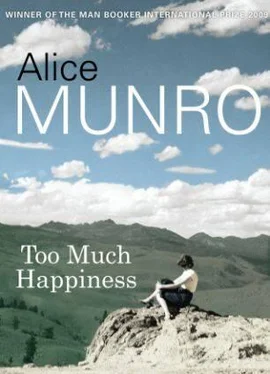Then the czar was assassinated and the political climate became disturbing and Vladimir entered a period of such deep melancholy that he could not work or think.
Weierstrass had heard of the death of Sophia’s parents, and to allay her grief a little, as he said, he sent her information on his own new and excellent system of integrals. But instead of being drawn back to mathematics she took to writing theater reviews and popular science pieces for the papers. That was using a talent more marketable and not so disturbing to other people or so exhausting to herself, as mathematics.
The Kovalevsky family moved to Moscow, hoping that their luck would change.
Vladimir recovered, but he did not feel able to go back to teaching. He found a new opportunity for speculation, being offered a job in a company that produced naphtha from a petroleum spring. The company was owned by the brothers Ragozin, who had a refinery and a modern castle on the Volga. The job was contingent on Vladimir’s investing a sum of money, which he managed to borrow.
But this time Sophia sensed trouble ahead. The Ragozins did not like her and she did not like them. Vladimir was now more and more in their power. These are the new men, he said, they have no nonsense in them. He became aloof, he took on rough and superior airs. Name me one truly important woman, he said. One who has made any real difference in the world, except by seducing and murdering men. They are congenitally backwards and self-centered and if they get hold of any idea, any decent idea to devote themselves to, they become hysterical and ruin it with their self-importance.
That is the Ragozins talking, said Sophia.
Now she picked up her correspondence with Weierstrass. She left Fufu with her old friend Julia and set out for Germany. She wrote to Vladimir’s brother Alexander that Vladimir had bitten at the Ragozins’ bait so readily that it was really as if he were tempting fate to send him another blow. Nevertheless she wrote to her husband offering to come back. He did not reply favorably.
They met once more, in Paris. She was living there cheaply while Weierstrass tried to get her a job. She was again submerged in mathematical problems and so were the people she knew. Vladimir had become suspicious of the Ragozins but he had involved himself to the point where he could not pull out. Yet he talked of going to the United States. And did go, but came back.
In the fall of 1882 he wrote to his brother that he realized now that he was a completely worthless person. In November he reported the bankruptcy of the Ragozins. He was afraid that they might try to implicate him in certain criminal procedures. At Christmas he saw Fufu, who was now in Odessa with his brother’s family. He was happy that she remembered him, and that she was healthy and clever. After that he prepared farewell letters for Julia, his brother, certain other friends, but not Sophia. Also a letter for the court explaining some actions of his in the Ragozin matter.
He delayed a while longer. It was not until April that he tied a bag over his head and inhaled chloroform.
Sophia, in Paris, refused food and wouldn’t come out of her room. She concentrated all her thought on the refusal of food, so she would not have to feel what she was feeling.
She was force-fed, at last, and fell asleep. When she woke she was deeply ashamed of this performance. She asked for a pencil and paper, that she might continue working on a problem.
There was no money left. Weierstrass wrote and asked her to live with him as another sister. But he continued to pull strings wherever he could and was successful, finally, with his past student and friend Mittag-Leffler, in Sweden. The new University of Stockholm agreed to be the first university in Europe to take on a female mathematics professor.
At Odessa Sophia collected her daughter, taking her to live for the present with Julia. She was furious with the Ragozins. She wrote to Vladimir’s brother calling them “subtle, poisonous villains.” She persuaded the magistrate hearing the case to proclaim that all the evidence showed Vladimir to have been gullible but honest.
Then she took a train once more from Moscow to Petersburg to travel to her new and much publicized-and no doubt deplored-job in Sweden. She made the trip from Petersburg by sea. The boat rode into an overwhelming sunset. No more foolishness, she thought. I am now going to make a proper life.
She had not then met Maksim. Or won the Bordin Prize.
She left Berlin in the early afternoon, shortly after having said that last sad but relieved good-bye to Weierstrass. The train was old and slow, but clean and well heated, as you would expect any German train to be.
About halfway in the journey the man across from her opened up his newspaper, offering her any section she might like to read.
She thanked him, and refused.
He nodded towards the window, at the fine driving snow.
“Ah well,” he said. “What can one expect?”
“What indeed,” said Sophia.
“You are going beyond Rostock?”
He might have noted an accent that was not German. She did not mind his speaking to her or coming to such a conclusion about her. He was a good deal younger than she, decently dressed, slightly deferential. She had a feeling that he was someone she had met or seen before. But this did happen when you were travelling.
“To Copenhagen,” she said. “And then to Stockholm. For me the snow will only get thicker.”
“I will be leaving you at Rostock,” he said, perhaps to reassure her that she was not letting herself in for a long conversation. “Are you satisfied with Stockholm?”
“I detest Stockholm at this time of year. I hate it.”
She was surprised at herself. But he smiled delightedly and began to speak in Russian.
“Excuse me,” he said. “I was right. Now it is I who speak like a foreigner to you. But I studied in Russia at one time. In Petersburg.”
“You recognized my accent as Russian?”
“Not surely. Until you said what you did about Stockholm.”
“Do all Russians hate Stockholm?”
“No. No. But they say they hate. They hate. They love.”
“I should not have said it. The Swedes have been very good to me. They teach you things-”
At this point he shook his head, laughing.
“Really,” she said. “They have taught me to skate-”
“Assuredly. You did not learn to skate in Russia?”
“They are not so-so insistent about teaching you things as the Swedes are.”
“Nor on Bornholm,” he said. “I live now on Bornholm. The Danes are not so-insistent, that is the word. But of course on Bornholm we are not even Danes. We say we are not.”
He was a doctor, on the island of Bornholm. She wondered if it would be entirely out of line to ask him to look at her throat, which was now very sore. She decided that it would be.
He said that he had a long and probably a rough ferry ride ahead of him, after they had crossed the Danish border.
People on Bornholm did not think of themselves as Danes, he said, because they thought of themselves as Vikings taken over by the Hanseatic League in the sixteenth century. They had a fierce history, they took captives. Had she ever heard of the wicked Earl of Bothwell? Some people say he died on Bornholm, though the people of Zealand say he died there.
“He murdered the husband of the queen of Scotland and married her himself. But he died in chains. He died insane.”
“Mary Queen of Scots,” she said. “So I have heard.” And indeed she had, for the Scottish queen had been one of Aniuta’s early heroines.
“Oh, forgive me. I am chattering.”
“Forgive you?” said Sophia. “What have I to forgive you for?”
He flushed. He said, “I know who you are.”
Читать дальше












